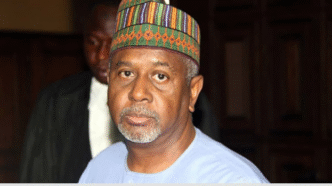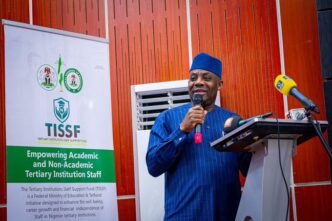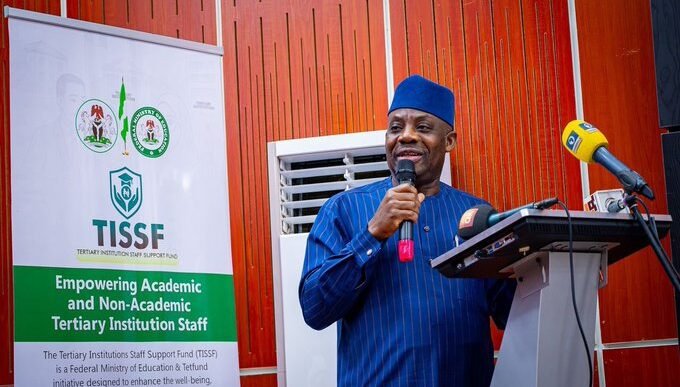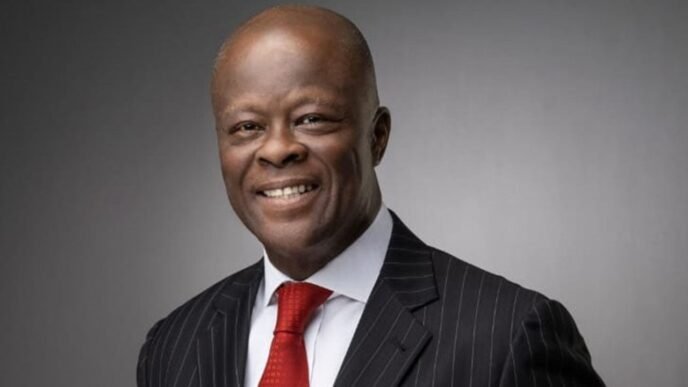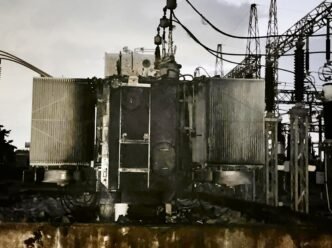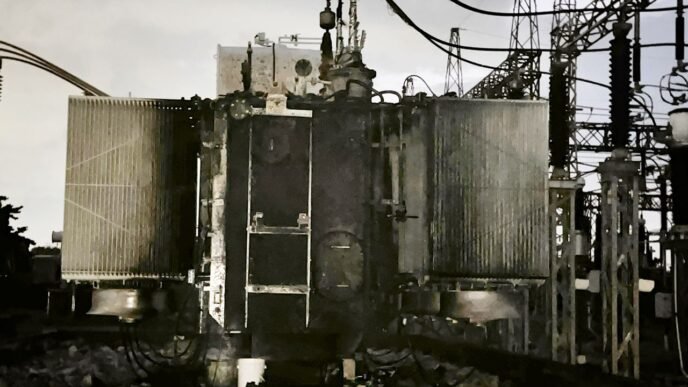The Federal High Court in Abuja on Tuesday dismissed an application filed by the Department of State Services (DSS) seeking to re-present exhibits earlier rejected in the trial of former National Security Adviser (NSA), Col. Sambo Dasuki (retd), over alleged unlawful possession of firearms.
Delivering his ruling, Justice Peter Lifu held that the court had already made a decision on the admissibility of the exhibits in question and therefore could not revisit or reverse itself on the same matter without new and compelling evidence.
The court ruled that the DSS’s application lacked merit and amounted to an abuse of judicial process, emphasizing that no court has the authority to admit evidence it had previously rejected without legal justification.
Court Upholds Earlier Ruling
Justice Lifu stated that the court’s earlier decision rejecting the exhibits remained valid and binding, stressing that judicial decisions cannot be revisited whimsically. He ruled that once a court has decided on an issue of admissibility, the only legitimate path to alter that decision is through an appeal, not a fresh application.
“The application before this court is unmeritorious. The prosecution seeks to re-present exhibits previously rejected by this same court. The law is clear: a court cannot sit on appeal over its own ruling,” Justice Lifu said.
He added that the prosecution had failed to demonstrate any new fact or legal development that would justify a reconsideration of the earlier ruling, declaring the DSS’s request as “an attempt to relitigate an issue already settled.”
DSS Motion and Background
The DSS, through its lead counsel Oladipupo Okpeseyi (SAN), had filed a motion asking the court to revisit certain exhibits it had earlier refused to admit during Dasuki’s ongoing trial.
At the previous sitting held on September 25, 2025, Okpeseyi urged the court to consider inspecting vehicles allegedly recovered from Dasuki’s residence during the execution of a search warrant in 2015.
He argued that the vehicles, which had been kept at the DSS headquarters in Abuja for nearly a decade, were critical pieces of evidence in the case and that a physical inspection by the court would facilitate their admission as exhibits.
According to the prosecution counsel, the vehicles were among items seized from Dasuki’s premises during a lawful search conducted shortly after he left office as the National Security Adviser.
“These vehicles have been in our custody for over ten years. Their inspection will help establish the chain of custody and confirm their connection to the charges before this honourable court,” Okpeseyi had argued.
Defence Opposes DSS Motion
However, the defence team, representing Col. Dasuki, strongly opposed the motion. They described it as a deliberate attempt to circumvent the court’s previous ruling and reintroduce evidence already rejected for failing to meet legal standards.
The defence counsel maintained that the prosecution’s application was an abuse of process and a waste of judicial time. They argued that the court could not lawfully revisit an issue already decided without an appeal from the party aggrieved by the earlier ruling.
They also noted that the DSS had multiple opportunities over the years to comply with evidentiary rules but failed to do so, instead choosing to repeatedly bring up similar motions.
“The law is settled that once an exhibit has been rejected, it remains inadmissible unless the decision is overturned by an appellate court,” the defence counsel said. “The prosecution’s motion is nothing more than an attempt to re-argue a settled matter.”
Judge Rejects Request to Inspect Vehicles
Justice Lifu also addressed the DSS’s request to move court proceedings temporarily to its headquarters in Abuja to inspect the said vehicles. The judge dismissed the idea, describing it as procedurally irregular and unnecessary, given that the exhibits had already been ruled inadmissible.
“The court has no business relocating proceedings to any security agency’s premises for the purpose of inspecting exhibits already rejected. That would not only compromise judicial independence but also violate due process,” he held.
He added that the integrity of the judicial process requires all exhibits to be presented, tested, and admitted within the courtroom setting, under the supervision of both parties and the court itself.
Case Background: Dasuki’s Legal Battle Since 2015
Col. Sambo Dasuki, who served as National Security Adviser under former President Goodluck Jonathan, has faced a series of legal battles since his arrest in 2015.
He was accused of illegal possession of firearms, criminal breach of trust, and misappropriation of $2.1 billion earmarked for the procurement of arms to combat Boko Haram insurgents.
The DSS alleged that a cache of firearms and several vehicles were discovered at his Abuja residence during a search executed shortly after he was removed from office.
Dasuki was subsequently charged before the Federal High Court in Abuja and later before the High Court of the Federal Capital Territory in separate cases filed by the Economic and Financial Crimes Commission (EFCC) and the DSS.
Although he was granted bail multiple times, Dasuki was held in DSS custody for more than four years before being released in December 2019 following directives by the Federal Government.
DSS’s Repeated Legal Setbacks
Tuesday’s ruling adds to a series of legal setbacks suffered by the DSS in its prosecution of the former NSA. The agency has, over the years, struggled to secure the admission of key exhibits due to procedural lapses and evidentiary deficiencies.
Legal analysts note that the repeated rejection of evidence in Dasuki’s case underscores the importance of strict adherence to rules of evidence, especially in high-profile national security prosecutions.
“The court has made it clear that even in matters involving state security, due process must be followed,” a senior legal practitioner in Abuja said. “The DSS cannot expect special treatment outside the law.”
Rule of Law Emphasized
In his remarks, Justice Lifu reaffirmed the court’s commitment to upholding the rule of law, stressing that the judiciary remains an impartial arbiter that cannot be swayed by institutional power or political considerations.
He reminded both the prosecution and defence that justice must not only be done but must be seen to be done, particularly in cases that attract public attention.
“The rule of law is the bedrock of our democracy. This court cannot compromise it for expediency or administrative convenience,” Justice Lifu stated.
He further warned that repeated attempts to revisit settled issues could be interpreted as deliberate obstruction of justice and cautioned all parties against acts capable of delaying the proceedings unnecessarily.
Implications for the Case
With the court’s latest decision, the DSS will have to proceed with the trial using only the evidence previously admitted by the court. This development narrows the prosecution’s case and may limit its ability to substantiate some of the allegations against the defendant.
Observers believe the ruling will also strengthen Dasuki’s defence, which has consistently argued that the DSS’s case is built on weak and improperly obtained evidence.
The case has now been adjourned to a future date for continuation of trial, during which the prosecution is expected to present its remaining witnesses and exhibits that meet the admissibility threshold set by the court.
Broader Impact on Security Prosecutions
Legal experts say the ruling has broader implications beyond Dasuki’s case. It sends a clear message to law enforcement agencies that judicial procedures must be respected and that shortcuts in evidence handling will not be tolerated by the courts.
A constitutional lawyer in Abuja noted that the court’s insistence on following due process would enhance public confidence in the justice system and discourage arbitrary prosecution practices.
“This judgment strengthens judicial oversight in national security cases. It reminds all agencies that justice must be pursued within the confines of the law,” he said.
Conclusion
The dismissal of the DSS application marks another pivotal moment in Col. Sambo Dasuki’s protracted legal battle. Nearly a decade after his arrest, the courts continue to uphold procedural fairness and the rule of law in the face of government prosecution.
Justice Lifu’s ruling serves as a reaffirmation that no agency, regardless of its mandate, is above the law. The judgment also highlights the judiciary’s role in balancing national security concerns with constitutional safeguards and the rights of the accused.
As the trial resumes, attention will now turn to how the DSS intends to advance its case without the disputed exhibits, and whether this latest decision will bring the long-running proceedings closer to a conclusion.

